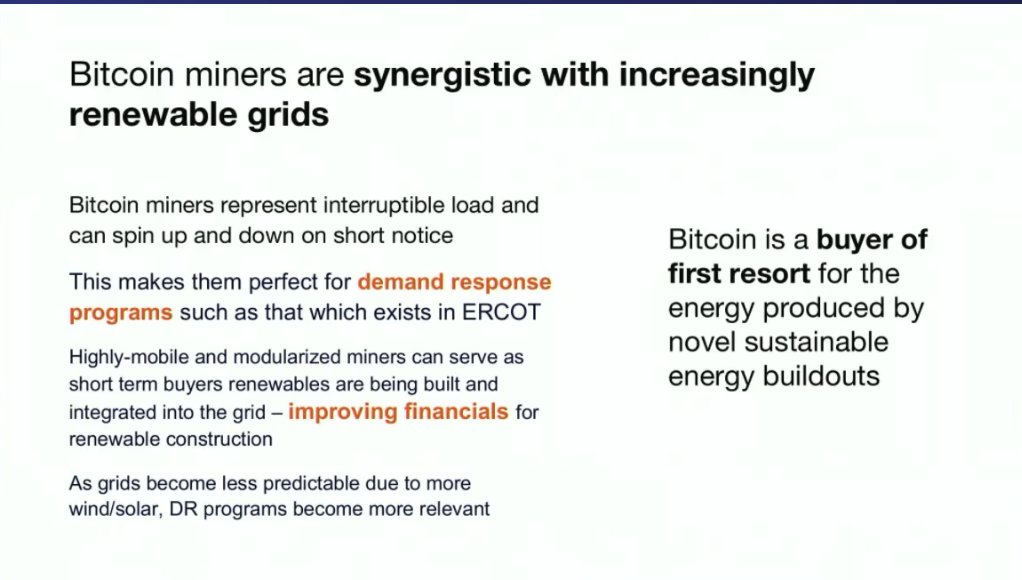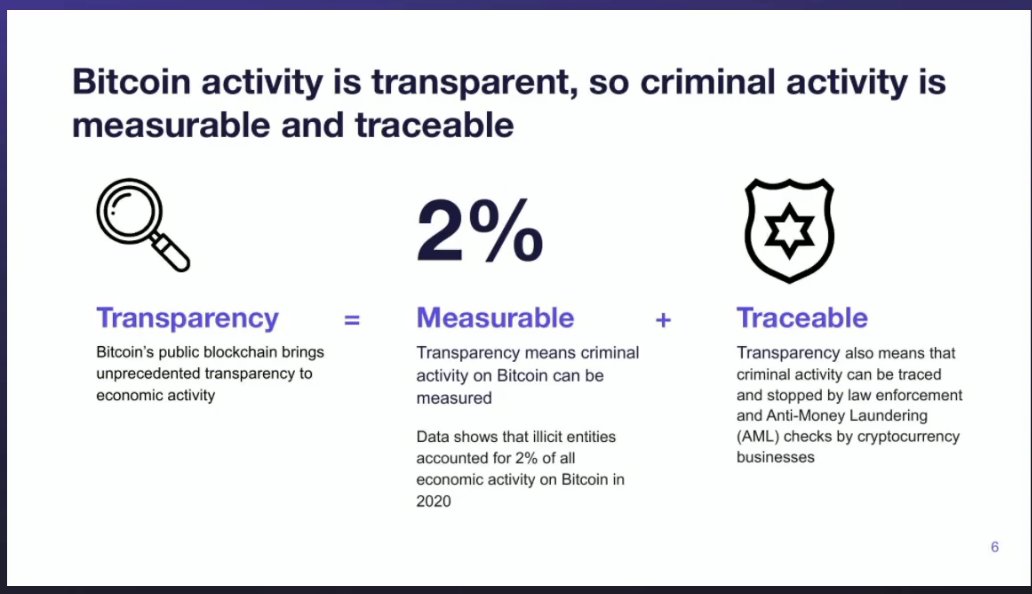notes from the b word conference
Track 1: Demystifing Bitcoin 👇
Track 1: Demystifing Bitcoin 👇
@nic__carter this is the premise you have to start with -- Bitcoin is currently storing massive amounts of wealth in its network, so there is a reason it needs energy 

@nic__carter why does bitcoin consume energy?
in short: security and distribution
"miners" perform work to gain the privilege of writing new transactions to the blockchain
mining also allows the free market to receive new issuance of $btc

in short: security and distribution
"miners" perform work to gain the privilege of writing new transactions to the blockchain
mining also allows the free market to receive new issuance of $btc


@nic__carter A key idea featured in slide 6 is "Proof of Stake and other such privileged validator-type 'fixes' to the energy consumption question just return us to the pre-bitcoin status quo".
In other words, the trade off is always:
security / decentralization vs. efficiency / cost
In other words, the trade off is always:
security / decentralization vs. efficiency / cost

@nic__carter most of bitcoin's energy spend is from the initial "extraction" process, just like with gold 

@nic__carter let's look at some Bitcoin mining stats:
- miners consume ~0.26% of the world's electricity
- miners consume ~0.11% of the world's energy
- mining energy is estimated at ~39% renewable
- bitcoin mining is responsible for ~0.1% of world's CO2 emissions
- miners consume ~0.26% of the world's electricity
- miners consume ~0.11% of the world's energy
- mining energy is estimated at ~39% renewable
- bitcoin mining is responsible for ~0.1% of world's CO2 emissions
@nic__carter how does Bitcoin energy consumption compare to other things?
👖 domestic tumble driers (1.6x BTC)
💰 gold mining & production (3.4x BTC)
🪖 US Military (7x BTC)
🍔 Domestic refrigeration (10x BTC)
👖 domestic tumble driers (1.6x BTC)
💰 gold mining & production (3.4x BTC)
🪖 US Military (7x BTC)
🍔 Domestic refrigeration (10x BTC)

@nic__carter "The perceived merit of an application's energy consumption is a function of one's subjective view of that application's utility"
@nic__carter Bitcoin might not matter to everyone, but it matters a lot to people in places where people are very "un-free" from a monetary perspective.
(ex. venezuela, argentina, turkey, kenya, nigeria)
(ex. venezuela, argentina, turkey, kenya, nigeria)
@nic__carter Bitcoin miners are highly "modularizable", meaning they can shuttle back and forth between different locations if they want to. This allows miners to pick the best type of energy available, and for mining to be rendered as green as its electricity inputs permit.
@nic__carter In contrast, gold mining can't ever be fully green as it relies on the physical sifting of ore.
@nic__carter Bitcoin's energy consumption is highly flexible and location-independent -- it can exploit imbalances in where energy is being lost "in the grid" 

@nic__carter this is a dense slide for me..
I think the tldr is:
"because Bitcoin miners can start/stop much faster than other energy consumers, they can buy electricity during slow times, and stop buying electricity during peak hours -> therefore having miners helps the market as a whole"
I think the tldr is:
"because Bitcoin miners can start/stop much faster than other energy consumers, they can buy electricity during slow times, and stop buying electricity during peak hours -> therefore having miners helps the market as a whole"

@nic__carter Bitcoin miners are making rapid progress towards sustainability:
- hashrate is leaving the coal mines of China
- 32% of hashrate has signed with the BMC and has started making quarterly disclosures
- miners are concerned with political risk
- westnern miners use cleaner energy
- hashrate is leaving the coal mines of China
- 32% of hashrate has signed with the BMC and has started making quarterly disclosures
- miners are concerned with political risk
- westnern miners use cleaner energy

@nic__carter "I think the prospects of bitcoin mining are bright" - @nic__carter
@philip_gradwell Bitcoin activity is transparent, so criminal activity is measurable and traceable
ILLEGAL STUFF accounted for 2% of activity on Bitcoin in 2020 (est.)
ILLEGAL STUFF accounted for 2% of activity on Bitcoin in 2020 (est.)

@philip_gradwell the vast majority of Bitcoin activity is currently trading and investment 

@philip_gradwell the dollar amounts of criminal activity may seem large ($5B - $10B), but when you compare to fiat, it's hard to even measure how much illicit activity is going on with cash
in Bitcoin it's only ~2% of all economic activity in the network
in Bitcoin it's only ~2% of all economic activity in the network

@philip_gradwell This isn't to say we should ignore the crime happening with Bitcoin.
"In order for $BTC to go mainstream, we need to measure, trace, and stop criminal activity" - @philip_gradwell
"In order for $BTC to go mainstream, we need to measure, trace, and stop criminal activity" - @philip_gradwell

@philip_gradwell There are so many get-rich-quick stories in BTC that newcomers are primed to getting scammed. We need to educate the community and we need to allow law enforcement to crack down on criminal activity.
@philip_gradwell regulatory frameworks are ready to step in and help reduce money laundering and terrorist financing 

@philip_gradwell more info about Bitcoin criminal activity and how it's being combated on the @chainalysis blog: blog.chainalysis.com 

• • •
Missing some Tweet in this thread? You can try to
force a refresh






















